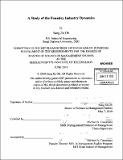A study of the foundry industry dynamics/
Author(s)
Oh, Sang Jin
DownloadFull printable version (6.998Mb)
Other Contributors
Sloan School of Management.
Advisor
Michael A. Cusumano.
Terms of use
Metadata
Show full item recordAbstract
In the process of industrial evolution, it is a general tendency that companies which specialize in a specific value chain have emerged. These companies should construct a business eco-system based on their own platform to compete successfully with vertically integrated companies and other specialized companies. They continue to sustain their competitive advantage only when they share their ability to create value with other eco-system partners. The thesis analyzes the dynamics of the foundry industry. Through the top-down approach (how the semiconductor industry trends have influenced the foundry industry), the foundry market size is expected to grow continuously as the semiconductor industry becomes more horizontal due to exponential increase in IC manufacturing/design cost and focusing strategy on design or manufacturing capabilities. In addition, the bottom-up approach (how companies in the foundry industry compete with each other) indicated that previous key success factors such as time to market, economies of scale and learning curve effect are not necessary conditions any more in this industry. Rather, the success of a foundry company is mainly driven by successful management of eco-system partners based on leading process platform. However, sustainability of platform leadership in the foundry industry can always be threaten by continuous innovation in a technology driven industry, hold-up problem with eco-system partners and change of regulations. These factors are expected to make the foundry industry extremely dynamic despite first mover advantages.
Description
Thesis (S.M.)--Massachusetts Institute of Technology, Sloan School of Management, 2010. Cataloged from PDF version of thesis. Includes bibliographical references (p. 76-79).
Date issued
2010Department
Sloan School of ManagementPublisher
Massachusetts Institute of Technology
Keywords
Sloan School of Management.